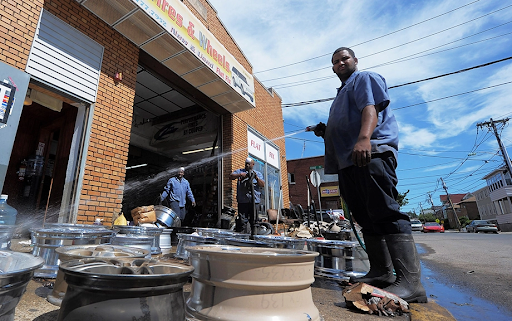Is It Necessary To Continue Paying Employees If A Natural Disaster Occurs?
Disasters have become a common occurrence in the US. As per National Centers For Environmental Information, in 2022, 15 weather or climatic disasters hit the United States, each causing damages of over $1 billion.
Author:James PierceReviewer:Alberto ThompsonDec 08, 2022686 Shares342.9K Views

Disasters have become a common occurrence in the US. As per National Centers For Environmental Information, in 2022, 15 weather or climatic disasters hit the United States, each causing damages of over $1 billion. One drought, one flood, ten severe storms, two typhoons, and one wildfire were among these calamities. Be it wildfires, floods, hurricanes, or landslides, all disasters cause considerable damage to a city. So, we thought that now would be a good moment to talk about what happens to employee earnings when a firm is forced to close because of a natural catastrophe.
It is essential to have a solid understanding of the responsibilities that lie with employers in these circumstances in terms of the payment of wages and salaries. When it comes to human resources, the answer lies solidly in the ambiguous territory which leaves the employee in a state of confusion. The first step for employers to do is to investigate the specifics of the employee's situation that led to the absence from work.
The (Federal) Fair Labor Standards Act (FLSA) is the legislation that sets the rules that employers must adhere to with regard to their compensation, pay raise, and the number of hours that they work. A natural catastrophe does provide businesses with some discretion in terms of the Fair Labor Standards Act (FLSA) obligations; nonetheless, the employer should obtain advice from the FLSA about the exempt or non-exempt categories of its workers.
Non-Exempt Employees
According to the Fair Labor Standards Act(FLSA), non-exempt workers are obliged to be paid only for the number of hours that they really put in. As a result, if a natural catastrophe prevents a business from providing a non-exempt worker with work, the business is excused from paying the worker. However, if a non-exempt employee is given any remote task (from home or elsewhere) while the firm is officially closed, that person is obligated to be compensated for the period that they spent working. There is, however, one notable exception to this rule: if a company has non-exempt workers who are paid a set wage for variable working weeks, and those workers do any work at all throughout the week, the firm is obligated to pay those workers.
Exempt Employees
It doesn't matter how many days or hours an exempt worker puts in during a given week, they are still entitled to their full compensation every week. However, according to the Fair Labor Standards Act (FLSA), exempt employees are not required to be compensated if they do not work when the business is closed for a full week because of a natural catastrophe. This is valid regardless of the employee's willingness to work.
There is a prohibition on making deductions for periods in which work is unavailable. To put it another way, an employee must be compensated for their time even if the firm chooses to suspend business for a few days even if they are available and eager to work. If the business was closed for less than a week, but the employee still wasn't able to show up for work, the situation would be reversed. When this occurs, deductions may be made from the employee's pay if they are away from work for one or more days due to circumstances beyond their control.
Companies should constantly keep in mind that exempt workers are required to be paid their entire wage even if they complete the smallest amount of labor in a day, such as responding to a single email or phone call.
Fire watch guards service, police service, and healthcare service are all super active due to the frequent occurrence of disasters in the US. When disaster strikes, employees must have the resources and training to deal with the unexpected disruptions to their routines, working conditions, and safety that result from the event. State and federal regulations impose several duties on companies, with steep fines for noncompliance. This article clarifies the regulations that govern the compensation of employees in the aftermath of a natural catastrophe.

James Pierce
Author
James Pierce, a Finance and Crypto expert, brings over 15 years of experience to his writing. With a Master's degree in Finance from Harvard University, James's insightful articles and research papers have earned him recognition in the industry.
His expertise spans financial markets and digital currencies, making him a trusted source for analysis and commentary. James seamlessly integrates his passion for travel into his work, providing readers with a unique perspective on global finance and the digital economy.
Outside of writing, James enjoys photography, hiking, and exploring local cuisines during his travels.

Alberto Thompson
Reviewer
Alberto Thompson is an acclaimed journalist, sports enthusiast, and economics aficionado renowned for his expertise and trustworthiness. Holding a Bachelor's degree in Journalism and Economics from Columbia University, Alberto brings over 15 years of media experience to his work, delivering insights that are both deep and accurate.
Outside of his professional pursuits, Alberto enjoys exploring the outdoors, indulging in sports, and immersing himself in literature. His dedication to providing informed perspectives and fostering meaningful discourse underscores his passion for journalism, sports, and economics. Alberto Thompson continues to make a significant impact in these fields, leaving an indelible mark through his commitment and expertise.
Latest Articles
Popular Articles